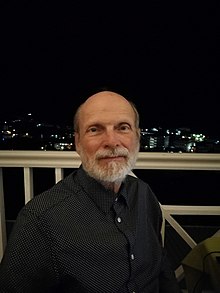 Gerhard Meisenberg is a retired professor of biochemistry who lives in the Caribbean island nation of Dominica. Originally from Germany, he studied at the universities of Bochum and Munich where he obtained his Ph.D. in biology. He then did biochemistry research in the United States for three years, before joining the faculty at Ross University School of Medicine in Dominica. He worked in Dominica from 1984 until the end of 2018. He became known as the senior author of a major textbook of medical biochemistry that has so far been printed in four editions. In addition, he embarked on research in educational research and psychometrics. His special interest is in secular trends of intelligence (Flynn effects), which he studied in Dominica.
Gerhard Meisenberg is a retired professor of biochemistry who lives in the Caribbean island nation of Dominica. Originally from Germany, he studied at the universities of Bochum and Munich where he obtained his Ph.D. in biology. He then did biochemistry research in the United States for three years, before joining the faculty at Ross University School of Medicine in Dominica. He worked in Dominica from 1984 until the end of 2018. He became known as the senior author of a major textbook of medical biochemistry that has so far been printed in four editions. In addition, he embarked on research in educational research and psychometrics. His special interest is in secular trends of intelligence (Flynn effects), which he studied in Dominica.
Grégoire Canlorbe: You are best known for your textbook Principles of Medical Biochemistry as well as your evolutionary psychology treatise In God’s Image: The Natural History of Intelligence and Ethics. How do you move from the former to the latter?
Gerhard Meisenberg: Biochemistry and the study of human behavior both are part of biology, although at slightly different levels. Psychology is one step down in the “hierarchy of sciences”: more complex, and less precise. What attracted me to human behavior are the big questions about why humans are the way they are, how they got that way, and what it means for our ongoing evolution. As Theodosius Dobzhansky famously said, “Nothing in biology makes sense except in the light of evolution.” I realized that the “big picture” of human history cannot be understood without an understanding of the ongoing evolution of the value systems that determine what aims people pursue and the intelligence that determines how good they are at attaining these aims. Neither of these are etched in stone. They keep evolving, both culturally and biologically.
Grégoire Canlorbe: A short while ago you co-wrote an article on sex differences in intelligence with Professor Richard Lynn. Could you remind us of the outlines of your perspective on this subject conducive to arousing hysteria?
Gerhard Meisenberg: There was actually a big debate about sex differences in the journal Mankind Quarterly, where contributors exposed the different views in the field. Briefly, there are those who hold that in modern Western societies there are no sex differences in intelligence that are big enough to have any real-world importance. James Flynn defended this position. The second view is represented by Richard Lynn, who claims that boys and girls start out pretty equal, but from the age of about 15 males gain an advantage over females because their mental as well as physical growth continues to an older age. Lynn estimates that adult men score 3 to 5 IQ points higher than women, which is a very small difference. He thinks that together with a higher male standard deviation, this is sufficient to explain male dominance in many intellectual fields. Then there are those, including myself, who emphasize that males and females have different strengths and weaknesses. For example, males have an up to one standard deviation (15 IQ points) advantage in mechanical reasoning, but females come out on top in tests of emotional intelligence and of verbal and episodic memory. There isn’t a huge amount of disagreement among scientists who study these sex differences. It’s a matter of emphasis.
Another thing to consider is that sex differences in some non-cognitive traits are much bigger than those in measured intelligence. Some aspects of vocational preferences have sex differences of at least one standard deviation, although this depends much on the way the differences are measured and analyzed. Perhaps the reason why women have lower mechanical comprehension is not that they are innately deficient in this kind of reasoning, but that they have zero interest in the workings of gears and pulleys. Therefore they never bother to develop the ability to understand these things.
[Read more…] about A conversation with Gerhard Meisenberg, for Psych

 Michael Anthony Woodley of Menie, Yr. (Younger), is a British ecologist and evolutionary psychologist, whose research on secular trends in different aspects of human intelligence has earned him considerable notability.
Michael Anthony Woodley of Menie, Yr. (Younger), is a British ecologist and evolutionary psychologist, whose research on secular trends in different aspects of human intelligence has earned him considerable notability.